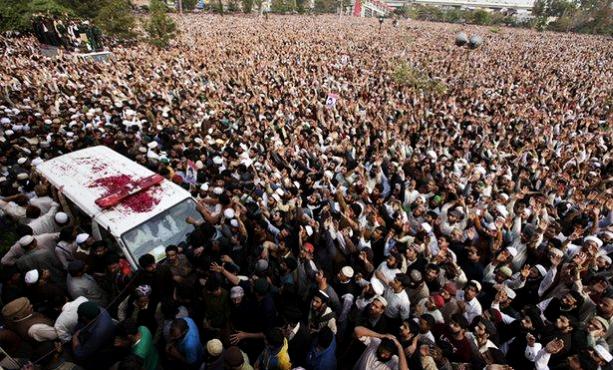The Agents of Extremism Have Won In Pakistan

LONDON: Mumtaz Qadri was the latest victim of extremism when he was executed by Pakistan on Monday for the assassination of Punjab governor Salman Taseer. His confession was not followed by years of introspection, regret or apologies. This was not just because he was deranged and incapable of coming to terms with the horror he had committed. He was celebrated, not banished, by crowds of Pakistanis as a hero who defended the honour of faith against blasphemy. He was told time and again by hordes of lawyers that his interpretation of vigilante justice was the correct one. He was assured by religious zealots that the inconvenience of trial and punishment was only temporary and to be followed by his pompous welcome into paradise.
The agents of extremism who had fuelled his hatred and rid him of his innate sense of humanity to the point where he shot a man due to his beliefs, never relented.
Qadri never had a chance. Not when he was denied the education to teach him what it entails to live in a society based on the rule of law as a responsible citizen. He did not have a chance when the vanguard of religious scholars, jurists and citizens stood back as the clerics at his local mosque told him every Friday that the Islamic nature of the state was threatened by secular politicians who wished to create a debate about defending the rights of minorities. No one rose to explain to him the constitutional safeguards for both Islamic injunctions and minority rights.
Neither did he have a chance when society stood by and saw that innocent Christians were implicated in accusations of blasphemy year after year as an easy alternative to eviction from their lands.
Nor when the Pakistani judicial system taught Qadri that the law only favours those who can afford it and the likes of him must obtain justice for themselves.
Qadri had lost the fight against extremism and intolerance long before he decided to act as judge, witness and executioner and met out the punishment for what he saw as blasphemy.While his conviction led him to assassinate the man he was appointed to protect as a Police commando, the unfaltering support and motivation offered by the agents of extremism in Pakistan brought thousands of his supporters to his funeral – a guarantee that such acts will happen again and again for as long as their conviction and self-righteous exoneration continues unchallenged.
Justice was served for many by his hanging. It was a sigh of relief and a restoration of retributive justice for many who felt suffocated by the sight of Qadri being showered with flower petals by lawyers upon his arrival in court for trial; by the relentless justifications being offered by retired judges in his defence; by the unending excuses being presented by right-wing TV anchors and conservative politicians alike.
Others who campaigned for the abolition of the death penalty for years and succeeded by winning a moratorium on executions, now find themselves in the same corner of the ring as those supporting the state killing its citizens in summary proceedings and military trials on charges of terrorism.
For years Pakistan had preached the importance of combating the root causes of terrorism and intolerance to the rest of the world – including in Afghanistan – and furthered the cause for distinguishing between and negotiating with terrorists. However, the onslaught of domestic violence and extremism festering for decades has now allowed the idea of fighting terrorism and extremism with executions, curtailment of civil liberties and indiscriminate bombings of large swathes of territory, to prevail in military and civilian policy circles alike. Violence has prevailed. The agents of extremism, it seems, have won.
An often overlooked element are the sectarian politics of the Qadri debacle. The Barelvi Sunnis of the Indian sub-continent hold themselves out to be the champions of the honour and prestige of Islamic holy figures. It is a common part of their discourse to shun the beliefs of fellow Deobandi and Wahabi Sunnis for failing to celebra
te the importance and stature of the Prophet Muhammad as they see fit. The Sunni sects join forces when they condemn the Shias for disrespect shown to certain other religious figures. The Barelvi mullahs had pounced on the opportunity to laud Qadri as one of their own who defended the honour of the Prophet before all others. Every incitement, provocation and praise issued from the pulpit in their mosques was not just meant for winning congregations and crowds, but for winning over other sects, by proving their devotion through oneupmanship. Unfortunately for the mullahs from the other sects, their silence and passive spectacle of the show of force by Qadri supporters cannot save their skin for long. They regularly target one another with accusations of blasphemy and flawed beliefs. It is only a question of time before another vigilante defender of faith takes matters into his own hands.
Pakistan must be saved. Her democracy, heritage, cultural plurality and freedom is under threat by home-grown extremism that engulfs her from within.
The answer is not more violence in the form of executions and military operations. The answer lies in undoing the indoctrination of hatred and intolerance that has been taught for decades in schools and mosques through progressive education; strengthening of the rule of law and restoring the faith of the people in its ability to give them justice when they feel wronged; and the universalisation of fundamental democratic rights that guarantee that raising your voice for the oppressed would not result in a death sentence. And above all, it lies in Pakistanis reclaiming and wringing back their religious and national identity from the agents of extremism.
Pakistani children must be given a real fighting chance before the next Mumtaz Qadri is created.
(The writer is a lawyer from Pakistan based in London).



